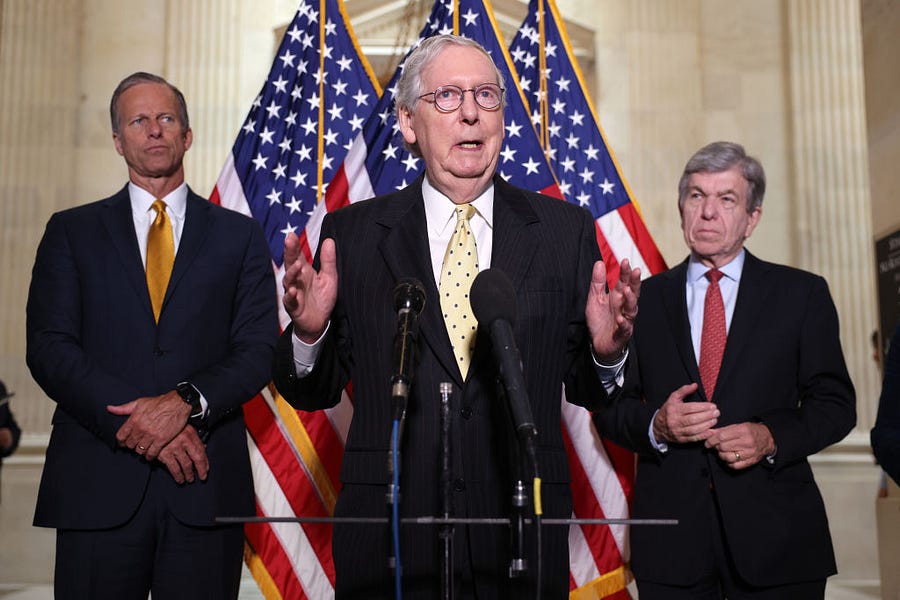When Senate Republicans voted on the Friday before Memorial Day to block the establishment of a bipartisan commission to study the January 6 attack on the Capitol, friend and foe alike said it was good politics.
As the vote was taking shape, Sen. John Thune, part of the Republican leadership team that helped defeat the measure, said that an independent commission would be a distraction from the GOP’s “midterm message.” “Anything that gets us rehashing the 2020 elections,” Thune told CNN, “is a day lost on being able to draw a contrast between us and the Democrats’ very radical left-wing agenda.” Plus, Thune fretted, the commission’s findings could be “weaponized politically and drug into next year.” Alaska’s Lisa Murkowski, one of just six Republicans to support the creation of the commission, seemed to agree with Thune’s premise as she lamented “a decision for the short-term political gain.”
But what if there is no gain?
Senate Republicans managed to kill an independent commission of experts chosen on a bipartisan basis that was required to finish its work by the end of the year. In its place, they will now have a committee of politicians selected entirely by House Speaker Nancy Pelosi. The committee will have no deadline, but will still retain at least a veneer of bipartisanship thanks to Pelosi’s inclusion of two Republican members, Reps. Liz Cheney of Wyoming and Adam Kinzinger of Illinois. Even better for Democrats, the committee itself is a powerful tool to divide and distract Republicans. Rather than outsourcing a difficult task to experts, Republicans have hired on loads of new problems for themselves.
It is certainly true that it is a point of pride for senators in both parties to look upon all actions of the House with disdain, when they look at them at all. But the select committee’s work, which will begin on Tuesday, will have significant consequences for Senate Republicans’ hopes of regaining the majority next year.
Let’s stipulate here that most of the Senate Republicans who voted against the commission either genuinely oppose additional inquest into the attack or are too scared of a primary challenge to say otherwise. Much of what was passed off as partisan swagger in opposing a commission based on the one that probed the 9/11 attacks was covering a painful political reality: A majority of Senate Republicans either won’t or can’t treat the attack for what it was. This is not surprising. Once they talked themselves into voting against convicting then-President Donald Trump for urging an angry mob to go disrupt the business of the legislative branch, a commission to investigate the attack was sort of beside the point. They ate frog first; they’re not going to quibble about the garnish.
But beyond the eight senators who voted to block the certification of President Joe Biden’s victory, there must have been enough out of the other 36 members who voted against the commission or abstained to have come up with the handful of additional votes needed to get the independent commission up and running. The six Senate Republicans who supported the panel—Murkowski, Ben Sasse of Nebraska, Bill Cassidy of Louisiana, Mitt Romney of Utah, Susan Collins of Maine, and Rob Portman of Ohio—just needed four more Republicans to come to their aid. About the only way to explain why someone like Missouri’s Roy Blunt—normal, politically savvy, experienced, and, most of all, about to retire—would vote against the commission was that he thought it was the smart thing to do for his party. It looks quite the opposite today.
Members like Thune and Blunt knew that if they defeated the commission, Pelosi would make good on her threat to empanel a special select committee to take up the probe. But they also would have expected that the committee would quickly devolve into partisan farce, much as much of the committee work in the House does these days. You know how it goes: The members of the committee make mini-speeches instead of asking questions and rehash talking points in hopes of generating #content for the local news at home, social media, and clickbait fundraising appeals. Once the GOP Senate nixed the plan for a commission that would have bipartisan legitimacy, they could count on their counterparts in the House to deliver a committee that had bipartisan illegitimacy.
No doubt California Rep. Adam Schiff and some of the other Democrats Pelosi picked on the panel will wear out the carpet between the committee room and the TV live-shot locations during the hearings, but now Republicans won’t have their wrecking crew there to discredit the proceedings. Pelosi goaded House Minority Leader Kevin McCarthy into boycotting the committee after she nixed two of his picks, Reps. Jim Jordan of Ohio and Jim Banks of Indiana, for their efforts to help Trump swipe a second term after losing the election. That left Pelosi the chance to have McCarthy’s mortal foe, Cheney, and Kinzinger as her model Republicans. Both are very conservative and very good on camera. They will add legitimacy to the effort, even as Republicans howl.
The howling could help Pelosi, too. The pressure is on McCarthy now to punish Cheney and Kinzinger with some kind of official opprobrium, like stripping them of their committee assignments, for accepting Pelosi’s appointments. If he gives in, he’ll be intensifying the House GOP’s cannibalistic tendencies. If he resists, Jordan and his fellow Jacobins will threaten a Trump-backed mutiny against the minority leader. McCarthy could try to placate them by allowing some sort of shadow minority committee for enthusiastic Trump apologists to attack the Democrats and minimize concerns about the attack itself. Double the chaos, double the fun. That’s what happens when one party’s leader is feared by her members and the other fears his members.
All of these things will be happening in the House, but will be seen by voters in competitive Senate races. As this effort devolves to Democrats’ political advantage, the move by Senate Republicans to scuttle the original commission looks like a significant unforced error.







Please note that we at The Dispatch hold ourselves, our work, and our commenters to a higher standard than other places on the internet. We welcome comments that foster genuine debate or discussion—including comments critical of us or our work—but responses that include ad hominem attacks on fellow Dispatch members or are intended to stoke fear and anger may be moderated.
With your membership, you only have the ability to comment on The Morning Dispatch articles. Consider upgrading to join the conversation everywhere.